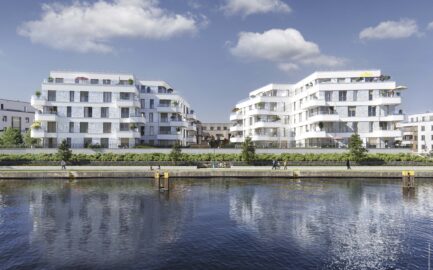Property management is generally not responsible for conflicts between neighbours, which are often quite stressful. BUWOG supplements the work of property management with competent “conflict support” and can therefore decisively improve coexistence and the satisfaction of tenants living in BUWOG properties. Klaudia Wrobel, a trained mediator from the quality management department, knows how this works.
Ms Wrobel, BUWOG has recently started offering “conflict support” and you have the tricky task of carrying it out. What should we understand by this?
Well, the term “conflict support” is fairly precise and self-explanatory. It involves support for conflicts that, in our case, are practically without exception disagreements between neighbours within the housing estates that BUWOG manages. Support is the point, not resolution or even decision-making for the parties to the conflict. As a conflict facilitator, my goal is to initiate a solution-oriented process between the actors or to resuscitate it; it’s to make it easier for those involved to find a basis for discussion again.
In essence, it’s about developing a foundation for dealing with each other in a situation that’s usually prolonged and stressful. Experience has shown that the involvement of an outside party has a de-escalating effect, implies commitment and generally offers a safe framework for dealing seriously with the situation.
What does conflict resolution look like in concrete terms?
Conflict support can vary quite widely and include, among other things, a mediative discussion with all parties involved, alternating individual discussions with joint sequences in between, or a direct exchange between the parties – often for the first time – with minimal moderative input from an outside person.
Why will you, specifically, be BUWOG’s official “angel of peace” in the future?
There are two reasons for this: As an employee of quality management at BUWOG, I’m regularly confronted with customer problems, so I’m fairly familiar with the issues that trigger the conflicts. I’ve also completed training as a mediator, thus I also possess the relevant expertise in the field of conflict support.
I think these are very good prerequisites for providing support in situations in which the parties involve property management, even if it’s a conflict that can be resolved and ended exclusively by the parties concerned, and in which property management is simply not responsible. For this reason, conflict support doesn’t occur within the context of property management. It was obvious that as quality management we’d take on the responsibility for this activity.

Is this type of service new?
No, it’s not, but I’m proud to be able to continue BUWOG’s long tradition in this respect. Experts have not only been brought into escalating conflicts in recent years; almost 20 years ago there were already initiatives aimed at helping BUWOG residents settle their conflicts and improve their neighbourly relations through purposeful and long-term measures. For example, from 2003 to 2011 there were projects with the FRATZ GRAZ association in Bruck, Graz, Villach and Vienna, and in 2018 and 2019 with Volkshilfe initiative in Vienna, which dealt with all sorts of issues such as conflicts of use concerning play areas, housing estate support projects, tenant dialogues and the joint design of the facilities concerned.
For whom and for what situations is the “conflict support” service intended?
Conflict support is a service for BUWOG tenants and can be availed in the event of any disagreements in the housing community. In most cases, it is about the varying perceptions of problems by parties, e.g. noise or odours. However, it can also be about the parties’ differing ideas concerning the use of the communal facilities; ventilation habits in the building, keeping animals and the daily interaction of the tenants with one other can also become issues.
Well, the fronts between tenants are often fairly hardened – is it realistic that as a conflict facilitator you can solve the problems between the parties of a building?
As I said at the beginning: I don’t solve conflicts, I support the parties concerned to do so themselves. Only the parties to the conflict decide whether they want support for their issue, whether they want to come to an agreement and, if so, what the agreement should look like in concrete terms. In contrast to a (court) judgement, which produces winners and losers and therefore fails to provide a basis for a long-term and well-functioning relationship, the parties to the dispute can develop an agreement that simultaneously serves their respective interests. Thus conflict mediation is certainly no pleasant gesture, but a future-oriented procedure through which the parties to the conflict can generate meaningful solutions of their own accord. And because the solutions come from the parties themselves and not from outside, they’re also sustainable.
Then we’ll keep our fingers crossed for all parties to conflict that it works out that way. But at the end of the day, what does BUWOG get out of it? After all, conflict support is a free service.
Conflicts between neighbours are frequent and often affect the quality of life much more than material problems. The clients turn to property management, though it is often not responsible and usually has only very limited options. In the long run, a certain frustration results from the mistaken belief that property management will bring about change and the sobering realisation that it doesn’t come to be. The issue is similar for colleagues in property management: they would like to ease the situation for those affected but can generally only ask tenants to be considerate and tolerant.
Conflict support gives us the chance to complement the work of property management, to improve the situation of the residents, and to reduce the time spent by our colleagues in property management. This is a win-win situation for all sides, which can only be beneficial to us as owners and landlords.









